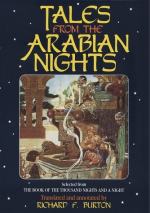[FN#183] For the ear conceiving love before the eye (the basis of half these love-stories), see vol. iii. 9.
[FN#184] According to Dr. Steingass “Mirwad"=the iron axle of a pulley or a wheel for drawing water or lifting loads, hence possibly a bar of metal, an ingot. But he is more inclined to take it in its usual sense of “Kohl-pencil.” Here “Mirwad” is the broader form like “Miftah” for “Miftah,” much used in Syria.
[FN#185] For the Ashrafi, a gold coin of variable value, see vol. iii. 294. It is still coined; the Calcutta Ashrafi worth 1 11s. 8d. is 1/16th (about 5s. to the oz.) better than the English standard, and the Regulations of May, 1793, made it weigh 190.894 grs. Troy.
[FN#186] In text “Anjar"=a flat platter; Pers.
[FN#187] By what physical process the author modestly leaves to the reader’s imagination. Easterns do not often notice this feminine venereal paroxysm which takes the place of seminal emission in the male. I have seen it happen to a girl when hanging by the arms a trifle too long from a gymnastic cross-bar; and I need hardly say that at such moments (if men only knew them) every woman, even the most modest, is an easy conquest. She will repent it when too late, but the flesh has been too strong for her.
[FN#188] A neat and suggestive touch of Eastern manners and morals.
[FN#189] In text “Ghayr Wa’d,” or “Min ghayr Wa’d.” Lit. without previous agreement: much used in this text for suddenly, unexpectedly, without design.
[FN#190] The reader will have remarked the use of the Arabic “’Alaka"=he hung, which with its branches greatly resembles the Lat. pendere.
[FN#191] Arab. “Min al-Malabis,” plur. of “Malbas"=anything pleasant or enjoyable; as the plural of “Milbas"=dress, garment, it cannot here apply.
[FN#192] i.e. “The Tigris” (Hid-dekel), with which the Egyptian writer seems to be imperfectly acquainted. See vols. i. 180; viii. 150.
[FN#193] The word, as usual misapplied in the West, is to be traced through the Turk. Kushk (pron. Kyushk) to the Pers. “Kushk"=an upper chamber.
[FN#194] Four including the doorkeeper. The Darwayshes were suspected of kidnapping, a practice common in the East, especially with holy men. I have noticed in my Pilgrimage (vols. ii. 273; iii. 327), that both at Meccah and at Al-Medinah the cheeks of babes are decorated with the locally called “Mashali"=three parallel gashes drawn by the barber with the razor down the fleshy portion of each cheek, from the exterior angles of the eyes almost to the corners of the mouth. According to the citizens this “Tashrit” is a modern practice distinctly opposed to the doctrine of Al-Islam; but, like the tattooing of girls, it is intended to save the children from being carried off, for good luck, by kidnapping pilgrims, especially Persians.
[FN#195] The hair being shaven or plucked and showing the darker skin. In the case of the axilla-pile, vellication is the popular process: see vol. ix. 139. Europeans who do not adopt this essential part of cleanliness in hot countries are looked upon as impure by Moslems.




